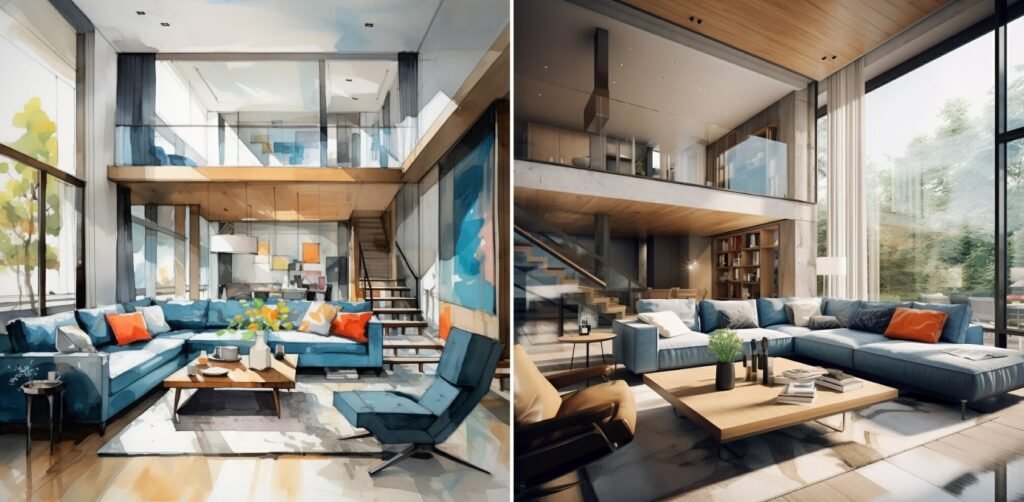There’s no denying that AI technology is revolutionizing the world of interior design, offering you the opportunity to transform your home decor in ways you never imagined. By harnessing the power of algorithms and machine learning, AI can analyze your preferences, spatial dynamics, and design trends to create personalized decorating solutions tailored to your unique needs and tastes. In this blog post, we’ll explore the benefits of integrating AI into your home decor projects, from personalized design recommendations to cost-effective solutions and future trends in interior design. Discover how AI can elevate your living space to new heights.
Key Takeaways:
- Personalized Design: AI can provide personalized design recommendations tailored to individual preferences and lifestyle.
- Efficiency and Speed: AI reduces the time needed for room decorating projects through quick generation of design options.
- Cost-Effectiveness: AI optimizes resources and suggests budget-friendly alternatives, making room decorating more cost-effective.
- Future Trends: AI advancements may include predictive analytics for anticipating design trends and promoting sustainable practices.
- Human-AI Collaboration: The future of interior design will likely involve enhanced collaboration between designers and AI to create innovative and personalized designs.

Understanding AI in Interior Design
Interior design has been revolutionized by the integration of Artificial Intelligence (AI) technologies. To understand how AI impacts space analysis, you should know that AI systems utilize advanced imaging and spatial analysis tools to comprehend the dimensions and characteristics of a room. By processing this data, AI can suggest optimal furniture placement, color schemes, and decor items to optimize the space for you. Additionally, this technology can identify and correct design flaws, ensuring that every element contributes to the overall aesthetic and functionality of your living space.
How AI Analyzes Space
AI systems utilize advanced imaging and spatial analysis tools to understand the dimensions and features of a room. By processing this data, AI can suggest the best furniture placement, color schemes, and decor items to optimize the space. This technology can also identify and mitigate design flaws, ensuring that every element of the room contributes to the overall aesthetic and functionality.
Benefits of Using AI for Room Decorating
One of the primary advantages of AI in room decorating is its ability to provide personalized design recommendations based on individual preferences and lifestyle. This tailored design plan ensures that the outcome is both visually appealing and suited to your daily needs. AI dramatically reduces the time required to plan and execute a decorating project, leading to faster project completion and reduced costs.
Home Interior Ideas and Future Trends
Advanced Predictive Analytics
With the advancements in AI, you can expect more sophisticated predictive analytics to shape the future of interior design. Predictive analytics will analyze design trends and user preferences to provide highly personalized and accurate recommendations. This technology will enable designers to anticipate future trends and deliver cutting-edge designs tailored to your specific needs.
- Anticipating Trends: AI will analyze data to predict upcoming design trends.
- Personalized Recommendations: AI will provide tailored design solutions based on your preferences and lifestyle.
AI-Driven Sustainability
AI-driven sustainability in interior design will play a crucial role in promoting eco-friendly practices. AI technology can analyze the environmental impact of various design elements and suggest sustainable alternatives. By integrating AI-driven sustainability solutions into your home decor, you can create beautiful spaces while minimizing your carbon footprint.
Enhanced Human-AI Collaboration
Any Enhanced collaboration between humans and AI will revolutionize the interior design process. Designers will use AI to analyze complex data and generate initial design concepts, allowing them to add their creative touch to refine the outcome. This synergy between humans and AI will result in innovative designs that reflect your personal style and preferences.
Summing Up
Now, you have seen the numerous ways AI can transform your home decor. By analyzing space, providing personalized design recommendations, increasing efficiency and speed, and offering cost-effective solutions, AI can revolutionize the way you decorate your living space. As future trends in AI and interior design evolve, you can look forward to even more advanced predictive analytics, sustainability-driven design practices, and enhanced collaboration between humans and AI. Embracing AI in interior design can lead to a more personalized, efficient, and sustainable approach to creating your ideal living environment.
FAQ
Q: How can AI transform my home decor?
A: AI can transform your home decor by providing personalized design recommendations, optimizing space utilization, and offering cost-effective solutions.
Q: Can AI help me save time in decorating my home?
A: Yes, AI can save you time in decorating your home by quickly generating design options and reducing the need for trial-and-error approaches.
Q: Will using AI for room decorating be cost-effective?
A: Yes, using AI for room decorating can be cost-effective as it helps optimize resources, minimize waste, and suggest budget-friendly alternatives.
Q: How does AI analyze space in interior design?
A: AI analyzes space in interior design by using advanced imaging and spatial analysis tools to understand room dimensions, features, and suggest optimal furniture placement.
Q: What are some future trends in AI and interior design?
A: Future trends in AI and interior design may include advanced predictive analytics, AI-driven sustainability, and enhanced human-AI collaboration to create innovative and sustainable designs.
